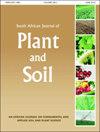Is the use of commercial organic ameliorants for cropping justified?
IF 0.7
Q3 AGRONOMY
引用次数: 1
Abstract
Large areas of soils in sub-Saharan Africa are poor in organic matter and nitrogen-phosphorus-potassium (NPK) fertilisation is essential for cropping. Most farmers are smallholders who cannot afford NPK fertilisers but they could consider alternatives like commercial organic ameliorants.This applies also for commercial farmers to improve profitability. The effects of nine ameliorants on the grain yield, biomass yield and harvest index of maize were evaluated over three years at Bothaville (8% clay), Ottosdal (12% clay) and Potchefstroom (34% clay). All ameliorants were applied as manufacturers prescribe. None of the ameliorants can serve as replacement of NPK fertilisers. Active ingredients other than the small amounts of N, P and K they contain, comprised of effective microorganisms (EMs), human manure, humic acids and poultry manure, and were not able to boost crop growth as manufacturers advocated. Biozone (EMs), Gliogrow (EMs), Growmax (Human manure), K-humate (Humic acid) and Crop Care (Humic acid) that were applied with NPK fertilisation resulted in 22 to 44% instances in significantly higher grain yield (938 to 1 288 kg ha−1) compared to the NPK control; however, many inconsistencies between experimental sites and years were observed. The use of commercial organic ameliorants cannot recommended to farmers without proper evaluation.商业有机改良作物的使用是否合理?
撒哈拉以南非洲的大片土壤缺乏有机质,氮、磷、钾(NPK)施肥对种植至关重要。大多数农民都是小农,负担不起氮磷钾肥料,但他们可以考虑商业有机改良剂等替代品。这也适用于商业农民提高盈利能力。以Bothaville(8%粘土)、Ottosdal(12%粘土)和Potchefstroom(34%粘土)为试验基地,评价了9种改良剂对玉米籽粒产量、生物量产量和收获指数的影响。所有改良剂均按制造商规定使用。这些改良剂都不能代替氮磷钾肥料。除了含有少量的氮、磷和钾外,它们还含有有效微生物(EMs)、人类粪便、腐植酸和家禽粪便等有效成分,并不能像制造商所倡导的那样促进作物生长。与氮磷钾对照相比,施用Biozone (EMs)、Gliogrow (EMs)、Growmax(人粪肥)、K-humate(腐植酸)和Crop Care(腐植酸)的氮磷钾组的产量显著提高了22%至44%(938至1 288 kg ha - 1);然而,在实验地点和年份之间观察到许多不一致。未经适当的评估,不能向农民推荐商业有机改良剂的使用。
本文章由计算机程序翻译,如有差异,请以英文原文为准。
求助全文
约1分钟内获得全文
求助全文
来源期刊

South African Journal of Plant and Soil
Agricultural and Biological Sciences-Plant Science
CiteScore
1.90
自引率
11.10%
发文量
32
期刊介绍:
The Journal has a proud history of publishing quality papers in the fields of applied plant and soil sciences and has, since its inception, recorded a vast body of scientific information with particular reference to South Africa.
 求助内容:
求助内容: 应助结果提醒方式:
应助结果提醒方式:


